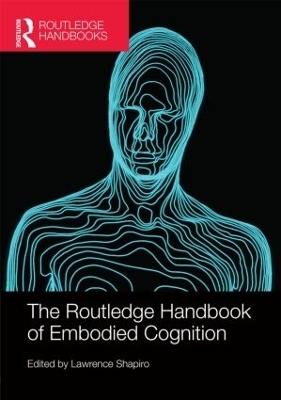
The Routledge Handbook of Embodied Cognition
Routledge (Verlag)
978-0-415-62361-2 (ISBN)
- Titel erscheint in neuer Auflage
- Artikel merken
Embodied cognition is one of the foremost areas of study and research in philosophy of mind, philosophy of psychology and cognitive science. The Routledge Handbook of Embodied Cognition is an outstanding guide and reference source to the key topics and debates in this exciting subject and essential reading for any student and scholar of philosophy of mind and cognitive science.
Comprising over thirty chapters by a team of international contributors, the Handbook is divided into six parts:
Historical underpinnings
Perspectives on embodied cognition
Applied embodied cognition: perception, language, and reasoning
Applied embodied cognition: social and moral cognition and emotion
Applied embodied cognition: memory, attention, and group cognition
Meta-topics.
The early chapters of the Handbook cover empirical and philosophical foundations of embodied cognition, focusing on Gibsonian and phenomenological approaches. Subsequent chapters cover additional, important themes common to work in embodied cognition, including embedded, extended and enactive cognition as well as chapters on empirical research in perception, language, reasoning, social and moral cognition, emotion, consciousness, memory, and learning and development.
Lawrence Shapiro is a professor in the Department of Philosophy, University of Wisconsin – Madison, USA. He has authored many articles spanning the range of philosophy of psychology. His most recent book, Embodied Cognition (Routledge, 2011), won the American Philosophical Association’s Joseph B. Gittler award in 2013.
Introduction Lawrence Shapiro
Part 1: Historical Underpinnings
1. Phenomenology and Embodied Cognition Shaun Gallagher
2. A Ten Commandments for Ecological Psychology Claire Michaels and Zsolt Palatinus
Part 2: Perspectives on Embodied Cognition
3. Extended Cognition Ken Aizawa
4. Complex Dynamical Systems Modeling in the Cognitive Sciences Anthony Chemero and Michael Richardson
5. The Role of the Motor System in Cognitive Functions Laila Craighero
6. Embedded and Situated Cognition Michael Dawson
7. Brain in a Vat or Body in a World? Brainbound versus Enactive Views of Experience Evan Thompson and Ezequiel Di Paolo
Part 3: Applied Embodied Cognition: Perception, Language and Reasoning
8. Music Perception and Embodied Music Cognition Marc Leman and Pieter-Jan Maes
9. Enactive Vision Erik Myin and Jan Degenaar
10. Perception and/for/with/as Action Cedar Reiner and Jeanine Stefanucci
11. Different Bodies, Different Minds: The Body Specificity of Language and Thought Daniel Casasanto
12. Embodiment and Language Comprehension Michael Kaschak, John L. Jones, Julie Carranza, and Melissa R. Fox
13. Embodiment and Language Claudia Scorolli
14. Linking Words to World: An Embodiment Perspective Chen Yu
15. Gesture in Reasoning: An Embodied Perspective Martha Alibali, Rebecca Boncoddo, and Autumn Hostetter
16. The Embodied Dynamics of Problem Solving: New Structure from Multi-Scale Interactions Jay Dixon, Damian Kelty-Stephen, and Jason Anastas
17. Grounded Mathematical Reasoning Mitchell Nathan
18. Embodied Interaction, Coordination and Reasoning in Computer Gameplay Tarja Susi
Part 4: Applied Embodied Cognition: Social and Moral Cognition and Emotion
19. Embodied Cognition and Theory of Mind Shannon Spaulding
20. When Bodies Interact… Culture is Born Tamer Soliman and Art Glenberg
21. Morality in the Flesh: A Review of Psychological Literature Chen-Bo Zhong and Brendan Strejcek
22. Body and Emotion Michelle Maiese
23. Embodied Emotion Concepts Paula Niedenthal, Adrienne Wood, and Magdalena Rychlowska
24. Embodiment in the Construction of Emotion Experience and Emotion Understanding Suzanne Oosterwijk and Linda Feldman Barrett
Part 5: Applied Embodied Cognition: Memory, Attention and Group Cognition
25. Visual Experience Michael Madary
26. First-order Embodiment, Second-order Embodiment, Third-order Embodiment Thomas Metzinger
27. Acting for Bodily Awareness Frederique de Vignemont
28. Memory and Action Katinka Dijkstra and Rolf Zwaan
29. The Embodiment of Attention in the Action-Perception Loop Michael Spivey and Stephanie Huette
30. Embodied Remembering John Sutton and Kellie Williamson
31. Embodiment, Cognition and the World Wide Web Paul Smart
32. The Constitution of Group Cognition Gerry Stahl
33. Varieties of Group Cognition Georg Theiner
Part 6: Meta-Topics
34. Cognition Gary Hatfield
35. Revolution, Reform, or Business as Usual? The Future Prospects for Embodied Cognition Michael Wheeler.
Index
| Reihe/Serie | Routledge Handbooks in Philosophy |
|---|---|
| Zusatzinfo | 4 Tables, black and white |
| Verlagsort | London |
| Sprache | englisch |
| Maße | 174 x 246 mm |
| Gewicht | 910 g |
| Themenwelt | Geisteswissenschaften ► Philosophie |
| Geisteswissenschaften ► Psychologie ► Allgemeine Psychologie | |
| Geisteswissenschaften ► Psychologie ► Verhaltenstherapie | |
| ISBN-10 | 0-415-62361-8 / 0415623618 |
| ISBN-13 | 978-0-415-62361-2 / 9780415623612 |
| Zustand | Neuware |
| Informationen gemäß Produktsicherheitsverordnung (GPSR) | |
| Haben Sie eine Frage zum Produkt? |
aus dem Bereich



